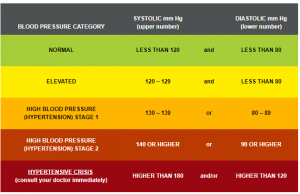When it comes to heart health, it’s all about knowing your numbers: your body mass index (BMI), your waist circumference, your blood pressure, and cholesterol. These are numbers that when above normal, can indicate a higher risk for developing heart disease. They are also numbers that you can do something about with lifestyle change like weight loss, eating well, and getting more active! Since it’s February and National Heart Health Month, we want to answer this question: How often should you have your blood pressure and cholesterol checked?
Based on physical appearance alone, it’s fairly easy to determine if your BMI or waist circumference is high. If you aren’t sure, there are many easy-to-use tools to help you understand these numbers. On the contrary, high blood pressure and high cholesterol very rarely show any signs or symptoms, so it can be difficult to know where your levels stand unless you get them checked. This can be dangerous, because the longer high blood pressure or high cholesterol are left undetected, the more damage they do to the body, possibly even silently leading to a stroke or heart attack. As the American Heart Association says, “When it comes to risk factors like high cholesterol, ignorance is not bliss. It can be deadly.”
So the only way to really know if you have high blood pressure or high cholesterol is to have them checked. Back to our question: How often should you have your blood pressure and cholesterol checked?
According to the American Heart Association:
BLOOD PRESSURE
-
If your blood pressure is normal (less than 120/80 mm Hg), you should be screened at least once every two years.
-
If your blood pressure reading is higher than normal (120-129/less than 80 mm Hg), your healthcare provider may take several readings over time/and or have you monitor your blood pressure at home before diagnosing you with high blood pressure.
-
If you are diagnosed with high blood pressure (see chart below for stages), your healthcare provider may recommend monitoring your blood pressure at home in addition to your regular healthcare visits.

Many shopping malls, pharmacies, and grocery stores have blood pressure machines you can use in the store. You can also buy a home blood pressure monitor at a drug store. However, these should not be replacements for regular screenings with your healthcare provider.
CHOLESTEROL
-
All adults age 20 or older should have their cholesterol checked every four to six years.
-
After that, you should work with your healthcare provider to determine your risk for heart disease and stroke. You may need to be tested more often if you have risk factors.